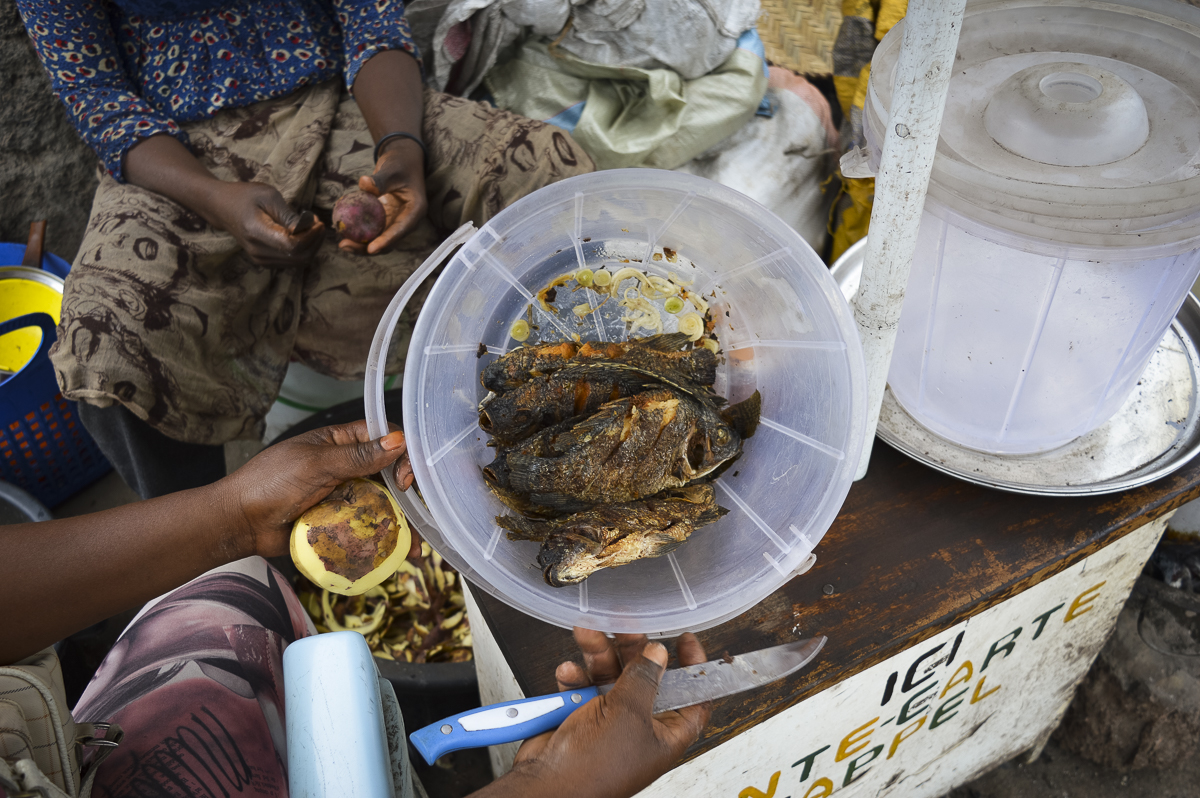
Noella Nyirabihogo, GPJ DRC
Nadège Kabuo, in blue, cooks and sells potatoes in Birere, a slum in Goma, the capital of Democratic Republic of Congo’s North Kivu province. She sells five small pieces of potato for 200 Congolese francs (about 20 cents), a price that’s affordable for many people here, but she says she can’t afford enough water to give to her customers so they can wash their hands.
GOMA, DEMOCRATIC REPUBLIC OF CONGO — Fish, Irish potatoes, doughnuts, chapatis and samosas are just a few of the foods available at roadside stalls here in this provincial capital.
Women dressed in garments made from colorful kitenge, a thick wax cotton fabric, prepare the food, soiling their clothes with oil and wood charcoal. Flies hover over the food and dust from unpaved roads settles on it. A few vendors cover their hands with plastic, but most touch the food, money and dirt without gloves, and there’s nowhere to wash their hands.
Louise Mangaza, 39, wears long braids and an apron over her clothes. She eyes a saucepan, in which oil heats. Nearby is a pile of freshly-peeled Irish potatoes.
The mother of eight says she’s been selling the fried potatoes, along with chips, bananas, fish, meat and other snacks, since she divorced her husband two years ago. On average, she earns about 5,000 Congolese francs ($5) per day.
Mangaza is one of the few vendors who covers her hands with plastic when serving her customers.
“My clients know very well that I keep the food I sell clean and hygienic in order to ensure that dust does not settle on it,” she says.
Unhygienic practices among street food sellers, combined with poor cleanliness on the part of many people who buy the food, contribute to health problems in Goma, the capital of Democratic Republic of Congo’s North Kivu province.
In 2015, more than 19,700 cases of cholera, an acute infection caused by ingestion of contaminated food or water, were reported in DRC. More than 3,000 of those cases were registered in the North Kivu province.
Diarrhea, which can be caused by poor hygiene, is also a major problem in DRC. The country is home to about 1 percent of the world’s population, but ranks third in the world for pneumonia and diarrhea-related deaths for children under the age of five, according to UNICEF.
Food prepared at the roadside, paired with a lack of handwashing in DRC in general, creates an environment that can result in typhoid, cholera and diarrhea, says Dr. Esdras Kakule, a physician at CBCA Ndosho Hospital. Patients who come to the hospital with typhoid and other infections often contract them because of poor hygiene, he says.
“Sensitization campaigns should increase throughout society, otherwise the lack of proper hygiene will continue to cause major health hazards, like cholera, within our community,” he says.



Handwashing is more common among people who eat in restaurants, says Fidele Amani, a pharmacist who works in Himbi, a middle-class neighborhood in Goma. But people who buy food from roadside stands suffer from intestinal infections.
Most of the medication he sells is related to stomach problems, he says, adding that it is common to sell 1000 tablets of medication to treat worms per week.
Nadège Kabuo, 35, a mother of five who sells food on the street in Birere, a slum in Goma, says she does what she can to keep things clean, but her customers don’t wash their hands. She has a container of water next to her table, but she uses all of it to wash her potatoes.
“I cannot afford more water to give all my clients,” she says.
The 20-liter container of water she can afford is used for washing potatoes, she says.
For many people in Goma, street food is the only option.
Chuma Mugisho, 25, a student at University of Goma, says food sold on the street is cheaper, compared to food sold in a restaurant.
“Here I can find something to chew at 500 [francs] (50 cents) only, and then I can spend the whole day without feeling hungry,” he says.
Some people who eat street food have taken precautions to keep themselves healthy.
“I have a protection technique,” says Linda Kalume, 19. “Each month I take tablets called Vermox because I do not trust the hygiene of this kind of food.”
Vermox is used to treat worms, including roundworm and hookworm. It is not generally prescribed for other intestinal problems.
Others avoid street food entirely. Zubeda Rachidi, 23, is turned off by the fact that the food sits in the sun all day long.
“Personally, I cannot buy this kind of food,” she says. “I fear for the health of others, especially for children who do not even have time to wash their hands before eating anything whatsoever.”
Mangaza says she dreams of a day when the government has a small business loan program so she and others can open small, clean restaurants.
“We also wish to work under decent and hygienic conditions, but we do not have means,” she says.
Ndayaho Sylvestre, GPJ, translated this article from French.







